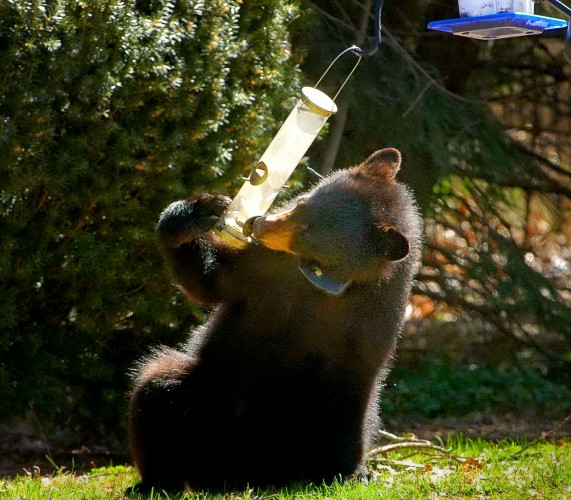
Bears in Massachusetts are ‘out and active’ as the hungry animals emerge
Be beary careful out there.
That’s the message from Massachusetts wildlife experts, as they urge residents to take down their bird feeders and secure other food sources with hungry bears emerging from their dens.
It’s starting to get warm, and young black bears are searching for food and new territory. For instance, MassWildlife officials the other day received a call about a bear attacking and killing a goat.
“Bears are emerging from their dens, and they’re out and active,” Dave Wattles, black bear and furbearer biologist with MassWildlife, told the Herald.
“People are starting to see bears again in their backyards, and it’s important for the public to start thinking about removing food sources that will attract bears,” he added.
There are at least 4,500 black bears in Massachusetts, and their range is expanding eastward.
Police officers last year tranquilized this bear and moved the animal to a forested area. (Massachusetts State Police photo)
In recent years, MassWildlife officials have responded to bear reports on the South Shore, in Lexington and Concord, and in other eastern Massachusetts spots.
“Every year we have bears popping up in eastern Mass., with the state’s increased bear population dispersing into the region,” Wattles said.
Bears will often ignore seasonally available natural foods, like acorns, and nuts, in favor of an easy meal at a backyard bird feeder. Then they’ll break into backyard chicken coops.
“Everyone always says a problem bear is getting into bird feeders and getting into chicken coops, but this is just bears being bears, and taking advantage of foods around homes,” Wattles said. “If people clean up these food sources, the bears would just be feeding in the woods, and there wouldn’t be these issues.”
He urged people to take down their bird feeders. Those who enjoy watching birds in their yard can add a water feature or grow native plants, shrubs, and trees to attract birds.
“Bird feeders are like the gateway drug for bears,” Wattles said. “It trains them to keep coming back to homes, and serious conflicts can follow from that.”
People with chicken coops, bee hives and livestock should install electric fencing to protect them from bears, he added.
Also, if you come across a bear in your backyard or on a trail, give the bear space and slowly back up. Don’t be aggressive with bears, Wattles emphasized.
The Massachusetts Department of Transportation is urging drivers to be careful on wooded roads.
“In the spring, black bears leave their dens & look for food!” MassDOT Safety posted. “Newly matured male cubs often cross roads between patches of forest, searching for their own territory. Mind your speed on wooded roads, use high-beam headlights responsibly, and scan road edges for movement!”


